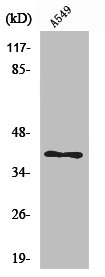USP50 Antibody
-
货号:CSB-PA004408
-
规格:¥880
-
图片:
-
其他:
产品详情
-
Uniprot No.:Q70EL3
-
基因名:USP50
-
别名:USP50 antibody; Inactive ubiquitin carboxyl-terminal hydrolase 50 antibody; Inactive ubiquitin-specific peptidase 50 antibody
-
宿主:Rabbit
-
反应种属:Human,Mouse
-
免疫原:Synthesized peptide derived from the C-terminal region of Human USP50.
-
免疫原种属:Homo sapiens (Human)
-
标记方式:Non-conjugated
-
抗体亚型:IgG
-
纯化方式:The antibody was affinity-purified from rabbit antiserum by affinity-chromatography using epitope-specific immunogen.
-
浓度:It differs from different batches. Please contact us to confirm it.
-
保存缓冲液:Liquid in PBS containing 50% glycerol, 0.5% BSA and 0.02% sodium azide.
-
产品提供形式:Liquid
-
应用范围:WB, IHC, ELISA
-
推荐稀释比:
Application Recommended Dilution WB 1:500-1:2000 IHC 1:100-1:300 ELISA 1:20000 -
Protocols:
-
储存条件:Upon receipt, store at -20°C or -80°C. Avoid repeated freeze.
-
货期:Basically, we can dispatch the products out in 1-3 working days after receiving your orders. Delivery time maybe differs from different purchasing way or location, please kindly consult your local distributors for specific delivery time.
相关产品
靶点详情
-
功能:Has no peptidase activity.
-
基因功能参考文献:
- verexpression of USP50 has no effect on Ku70 mRNA levels, while it reduces Ku70 protein levels by promoting Ku70 degradation, suggesting that USP50 may indirectly regulate Ku70 protein stability. PMID: 29101126
- the deubiquitinating enzyme USP50 binds to the ASC protein and subsequently regulates the inflammasome signaling pathway. PMID: 28094437
- USP50 may act through a HSP90-dependent mechanism to counteract CDC25B mitotic inducing activity and prevent Wee1 degradation. PMID: 20930503
- Clinical trial of gene-disease association and gene-environment interaction. (HuGE Navigator) PMID: 20379614
-
蛋白家族:Peptidase C19 family
-
组织特异性:Weakly expressed in a few tissues.
-
数据库链接:
HGNC: 20079
KEGG: hsa:373509
STRING: 9606.ENSP00000434676
UniGene: Hs.677758
Most popular with customers
-
-
YWHAB Recombinant Monoclonal Antibody
Applications: ELISA, WB, IF, FC
Species Reactivity: Human, Mouse, Rat
-
-
-
-
-
-





















